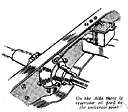whole
Also found in: Thesaurus, Medical, Acronyms, Idioms, Encyclopedia, Wikipedia.
whole
whole
(hōl)These adjectives mean including every constituent or individual: a whole town devastated by an earthquake; all the class going on a field trip; entire shipments lost by the distributor; gross income; the total cost of the project.
whole
(həʊl)whole
(hoʊl)adj.
whole
When you talk about the whole of something, you mean all of it.
Instead of using the whole of in front of a noun phrase beginning with the, you can simply use whole after the. For example, instead of saying 'The whole of the house was on fire', you can say 'The whole house was on fire'.
You can use whole in a similar way after this, that, or a possessive.
You use whole after a to emphasize that you mean all of something of a particular kind.
You can also use whole like this in front of the plural form of a noun.
Be Careful!
In front of plurals, whole does not have the same meaning as all. If you say 'All the buildings have been destroyed', you mean that every building has been destroyed. If you say 'Whole buildings have been destroyed', you mean that some buildings have been destroyed completely.
You use as a whole after a noun to emphasize that you are talking about all of something and regarding it as a single unit.
You add on the whole to a statement to show that what you are saying is true in general but may not be true in every case.
| Noun | 1. | whole - all of something including all its component elements or parts; "Europe considered as a whole"; "the whole of American literature" concept, conception, construct - an abstract or general idea inferred or derived from specific instances division, section, part - one of the portions into which something is regarded as divided and which together constitute a whole; "the written part of the exam"; "the finance section of the company"; "the BBC's engineering division" unit - a single undivided whole; "an idea is not a unit that can be moved from one brain to another" compound - a whole formed by a union of two or more elements or parts |
| 2. |  whole - an assemblage of parts that is regarded as a single entity; "how big is that part compared to the whole?"; "the team is a unit" whole - an assemblage of parts that is regarded as a single entity; "how big is that part compared to the whole?"; "the team is a unit"object, physical object - a tangible and visible entity; an entity that can cast a shadow; "it was full of rackets, balls and other objects" congener - a whole (a thing or person) of the same kind or category as another; "lard was also used, though its congener, butter, was more frequently employed"; "the American shopkeeper differs from his European congener" animate thing, living thing - a living (or once living) entity natural object - an object occurring naturally; not made by man assembly - a unit consisting of components that have been fitted together item - a whole individual unit; especially when included in a list or collection; "they reduced the price on many items" part, portion - something less than the whole of a human artifact; "the rear part of the house"; "glue the two parts together" | |
| Adj. | 1. |  whole - including all components without exception; being one unit or constituting the full amount or extent or duration; complete; "gave his whole attention"; "a whole wardrobe for the tropics"; "the whole hog"; "a whole week"; "the baby cried the whole trip home"; "a whole loaf of bread" whole - including all components without exception; being one unit or constituting the full amount or extent or duration; complete; "gave his whole attention"; "a whole wardrobe for the tropics"; "the whole hog"; "a whole week"; "the baby cried the whole trip home"; "a whole loaf of bread"complete - having every necessary or normal part or component or step; "a complete meal"; "a complete wardrobe"; "a complete set of the Britannica"; "a complete set of china"; "a complete defeat"; "a complete accounting" fractional - constituting or comprising a part or fraction of a possible whole or entirety; "a fractional share of the vote"; "a partial dose" |
| 2. |  whole - (of siblings) having the same parents; "whole brothers and sisters" whole - (of siblings) having the same parents; "whole brothers and sisters"half - (of siblings) related through one parent only; "a half brother"; "half sister" | |
| 3. | whole - not injured uninjured - not injured physically or mentally | |
| 4. | whole - exhibiting or restored to vigorous good health; "hale and hearty"; "whole in mind and body"; "a whole person again" healthy - having or indicating good health in body or mind; free from infirmity or disease; "a rosy healthy baby"; "staying fit and healthy" | |
| 5. |  whole - acting together as a single undiversified whole; "a solid voting bloc" whole - acting together as a single undiversified whole; "a solid voting bloc"undiversified - not diversified | |
| Adv. | 1. |  whole - to a complete degree or to the full or entire extent (`whole' is often used informally for `wholly'); "he was wholly convinced"; "entirely satisfied with the meal"; "it was completely different from what we expected"; "was completely at fault"; "a totally new situation"; "the directions were all wrong"; "it was not altogether her fault"; "an altogether new approach"; "a whole new idea" whole - to a complete degree or to the full or entire extent (`whole' is often used informally for `wholly'); "he was wholly convinced"; "entirely satisfied with the meal"; "it was completely different from what we expected"; "was completely at fault"; "a totally new situation"; "the directions were all wrong"; "it was not altogether her fault"; "an altogether new approach"; "a whole new idea"colloquialism - a colloquial expression; characteristic of spoken or written communication that seeks to imitate informal speech |
whole
complete cut, divided, fragmented, partial, incomplete, in pieces
undamaged broken, damaged
healthy diseased, ill, sick, crook (Austral. & N.Z. informal), ailing, sickly, unwell, under-the-weather
whole
adjectivewhole
[həʊl]the whole may be greater than the sum of the or its parts → el todo puede ser mayor que la suma de las partes
four quarters make a whole → cuatro cuartos hacen una unidad
as a whole the estate is to be sold as a whole → la propiedad va a venderse como una unidad
Europe should be seen as a whole → Europa debería considerarse como un todo or una unidad
taken as a whole, the project is a success → si se considera en su totalidad, el proyecto es un éxito
is this true just in India, or in the world as a whole? → ¿es ése el caso sólo en la India o en todo el mundo?
the whole of → todo
the whole of Glasgow was talking about it → todo Glasgow hablaba de ello
the whole of our output this year → toda nuestra producción de este año
the whole of July → todo el mes de julio
the whole of the time → todo el tiempo
the whole of Europe → toda Europa, Europa entera
the whole of the morning → toda la mañana, la mañana entera
on the whole → en general
the whole family was there → toda la familia estaba allí
we spent the whole summer in Italy → pasamos todo el verano or el verano entero en Italia
a whole hour → toda una hora, una hora entera
it rained for three whole days → llovió durante tres días enteros or seguidos
whole towns were destroyed → pueblos enteros fueron destruidos
along its whole length → todo a lo largo
I've never told anyone in my whole life → nunca se lo he dicho a nadie en toda mi vida
a whole load of people were there → había un montón de gente allí
he took the whole lot → se lo llevó todo
I'm fed up with the whole lot of them → estoy harto de todos ellos
a whole lot better/worse → muchísimo mejor/peor
it's a whole new world to me → es un mundo completamente nuevo para mí
I've bought myself a whole new wardrobe → me he comprado un vestuario completamente nuevo
the whole point was to avoid that happening → el propósito era evitar que eso pasara
the whole point of coming here was to relax → el objetivo de venir aquí era relajarse
the figures don't tell the whole story → las cifras no nos dicen toda la verdad
let's forget the whole thing → olvidemos todo el asunto, olvidémoslo todo
he didn't tell the whole truth → no dijo toda la verdad
the whole world → todo el mundo, el mundo entero
to go the whole hog → liarse la manta a la cabeza
this is a whole new ball game → es una historia distinta por completo, es algo completamente distinto
not a glass was left whole following the party → no quedó ni un vaso entero tras la fiesta
keep the egg yolks whole → procure que no se rompan las yemas de huevo
the seal on the letter was still whole → el sello de la carta no estaba roto
to make sth whole (liter) (= heal) → curar algo
he swallowed it whole → se lo tragó entero
whole
[ˈhəʊl]the whole class → toute la classe, la classe entière
the whole afternoon → tout l'après-midi
a whole afternoon → un après-midi entier
to spend a whole afternoon doing sth → passer un après-midi entier à faire qch
a whole box of chocolates → toute une boîte de chocolats, une boîte entière de chocolats
the whole world → le monde entier
We spent the whole summer in Italy → Nous avons passé tout l'été en Italie.
the whole time (that) → pendant tout le temps que
It rained the whole time we were there → Il a plu pendant tout le temps que nous étions là-bas.
Whole villages were destroyed → Des villages entiers furent détruits.
the whole lot, the whole lot of it (= all of it) → tout
the whole lot, the whole lot of them (= all of them) → tous (sans exception)
"Aren't there any biscuits left?" - "No, Caroline took the whole lot." → "Il ne reste plus de biscuits?" "Non, Caroline les a tous pris."
I saw a whole different side of him that day → J'ai vu une facette de lui entièrement différente ce jour-là., Je l'ai vu sous un tout autre jour ce jour-là.
There's a whole group of friends I want you to meet → Il y a tout un groupe d'amis que j'aimerais te présenter.
a whole new way of doing business → toute une nouvelle façon de faire des affaires
never in my whole life → jamais de la vie
a small percentage of the whole → un petit pourcentage de l'ensemble
the whole of sth → l'ensemble de qch
the whole of the town → l'ensemble de la ville, toute la ville
The whole of Wales was affected → L'ensemble du pays de Galles a été touché.
the whole of the time → tout le temps
for the whole of July → pendant tout le mois de juillet
The earth's weather system is an integrated whole → La météorologie terrestre est un tout intégré., La météorologie terrestre est un ensemble intégré.
a coherent whole → un tout cohérent, un ensemble cohérent
whole
whole
:whole
:whole
[həʊl]with my whole heart → con tutto il mio cuore
a whole lot of things → una gran quantità di cose, moltissime cose
a whole lot of people → moltissima gente
a whole lot better → molto meglio
the whole lot → tutto
the whole lot (of them) → tutti/e
3 whole days → 3 giorni interi
the whole day → tutto il giorno, il giorno intero
I read the whole book → ho letto tutto il libro or il libro per intero
the whole world → tutto il mondo, il mondo intero
whole villages were destroyed → interi paesi furono distrutti
is that the whole truth? → è tutta la verità?
but the whole purpose or point was to ... → ma lo scopo era proprio di...
to swallow sth whole → mandar giù qc intero/a (fig) he swallowed it whole → l'ha bevuta tutta
to our surprise he came back whole → con nostra sorpresa tornò sano e salvo
the whole of the sum → la somma intera, l'intera somma
the whole of the time → tutto il tempo
the whole of Italy → tutta l'Italia, l'Italia intera
the whole of the town → la città intera, tutta la città
as a whole → nell'insieme, nel suo insieme
on the whole → nel complesso
whole
(həul) adjectivewhole
→ الكُلّ, بِكَامِلِهِ celek, celý hele ganz, Ganzes ολόκληρος, σύνολο entero, todo kokonainen, kokonaisuus entier, tout čitav, cjelina intero, tutto 全体, 全体の 전체, 전체의 geheel, hele hel, hele całość, cały inteiro, total целое, целый hel, helhet ทั้งหมด, สิ่งที่ครบถ้วน bütün tất cả, toàn bộ 全部, 完整的whole
- All through June (US)
For the whole of June (UK)